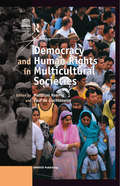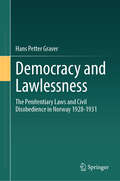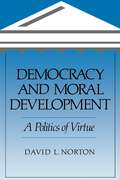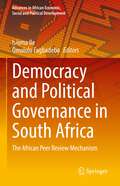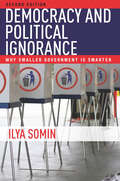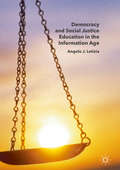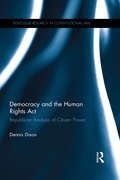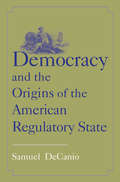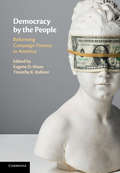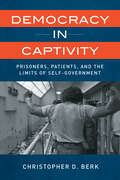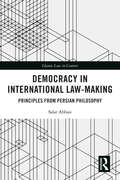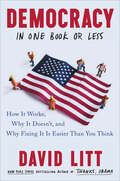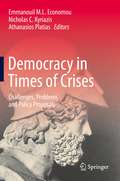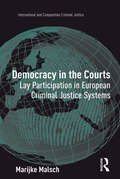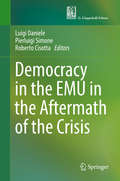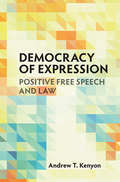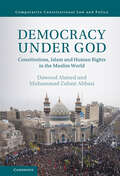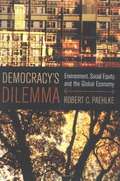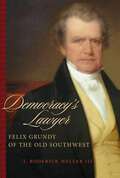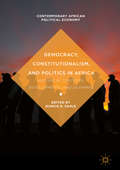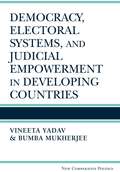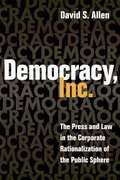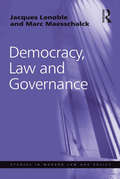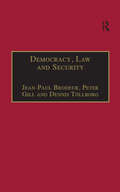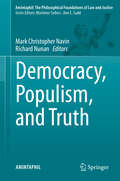- Table View
- List View
Democracy and Human Rights in Multicultural Societies
by Paul De Guchteneire Matthias KoenigPublished in association with UNESCO, Democracy and Human Rights in Multicultural Societies examines the political governance of cultural diversity, specifically how public policy-making has dealt with the claims for cultural recognition that have increasingly been expressed by ethno-national movements, language groups, religious minorities, indigenous peoples and migrant communities. Its principle aim is to understand, explain and assess public-policy responses to ethnic, linguistic and religious diversity. Adopting interdisciplinary perspectives of comparative social sciences, the contributors address the conditions, forms, and consequences of democratic and human-rights-based governance of multi-ethnic, multi-lingual and multi-faith societies.
Democracy and Lawlessness: The Penitentiary Laws and Civil Disobedience in Norway 1928-1931
by Hans Petter GraverThe book addresses efforts to politically influence and curb the judicial system, by telling the story of the enactment of controversial laws in Norway in 1927. It draws parallels to current challenges to the autonomy of the legal order, both in countries where populist forces seek control over the courts, and in other countries where increasing levels of conflict, such as around the climate crisis and the pandemic, challenge the rule of law. In 1927 the Norwegian Parliament enacted three laws that changes the rules of the game in the relation between Labor and Capital. The law was weaponized in benefit of the employers. By this, the legislature departed from the classic ideal of equality before the law and law’s autonomy as a neutral order. The new laws were called the penitentiary laws. The demonstrations against one of the laws, the Arbitration Act in 1928 were the largest manifestation of civil disobedience in Norwegian history. They provoked a level of lawlessness that has not been matched, with exception of the situation during the German occupation 1940-1945. The book analyses the events with the aid of the theory of civil disobedience in liberal democracies put forward by the philosopher John Rawls and the theory of the legal complex developed by the socio-legal scholars Terence Halliday, Lucien Karpic, and Malcolm Feeley. This book tells the story of the Penitentiary Laws, how the laws came into being, how they were received and resisted, and how they were defeated through civil disobedience and with the support of a legal complex which reached far into the legal system. The outcome of the conflict may be one of the factors that explain the high level of trust that the legal institutions enjoy in present day Norway.
Democracy and Moral Development: A Politics of Virtue
by David L. NortonAt a time when politics and virtue seem less compatible than oil and water, Democracy and Moral Development shows how to bring the two together. Philosopher David Norton applies classical concepts of virtue to the premises of modern democracy. The centerpiece of the book is a model of organizational management applicable to the state, business, the professions, and voluntary communities.
Democracy and Political Governance in South Africa: The African Peer Review Mechanism (Advances in African Economic, Social and Political Development)
by Omololu Fagbadebo Isioma IleThis book presents a holistic perspective and analysis of democratic practice, processes, and governance in South Africa. It examines the development in the South African governing system and its response to the challenges of the crisis of governance under the influence of the African Peer Review Mechanism (APRM). While doing so, the book's central objective is to examine the progress of the South African government in strengthening democracy and political governance. Each of the contributions follows a similar structure and addresses the following thematic issues: (1) Assessment of the implementation of the core APRM-related programs; (2) Identification of areas of excellence and prognosis for further improvement; (3) Identification of the weak areas of each and how to make the future implementation better, (4) Identification areas to improve democracy and political governance. A self-assessment strategy initiated by the African Union (AU) in 2002 and adopted in 2003, the APRM is a voluntary mechanism adopted by countries in the African continent to improve governance in general. As a specialized AU agency, APRM monitors the peer review activities of each African country. It serves as a tool for sharing experiences, reinforcing best practices, identifying deficiencies, and assessing capacity-building needs to foster policies, standards, and practices that lead to political stability, high economic growth, sustainable development, and accelerated sub-regional and continental economic integration. This book will be useful for and appeal to scholars and researchers in political science, public administration, and the social sciences in general, as well as policy-makers interested in a better understanding of democratic practice and processes, governance, public policy, and the African Peer Review Mechanism.
Democracy and Political Ignorance: Why Smaller Government Is Smarter, Second Edition
by Ilya SominOne of the biggest problems with modern democracy is that most of the public is usually ignorant of politics and government. Many people understand that their votes are unlikely to change the outcome of an election and don't see the point in learning much about politics. This creates a nation of people with little political knowledge and little ability to objectively evaluate what they do know. The second edition of Democracy and Political Ignorance fully updates its analysis to include new and vital discussions on the implications of the "Big Sort" for politics, the link between political ignorance and the disproportionate political influence of the wealthy, assessment of proposed new strategies for increasing political knowledge, and up-to-date survey data on political ignorance during recent elections. Ilya Somin mines the depths of the current state of ignorance in America and reveals it as a major problem for democracy. He weighs various options for solving this problem, provocatively arguing that political ignorance is best mitigated and its effects lessened by decentralizing and limiting government. People make better decisions when they have stronger incentives to acquire relevant information--and to use it wisely.
Democracy and Social Justice Education in the Information Age
by Angelo J. LetiziaThis book functions as a toolbox for preservice and veteran teachers, as well as teacher educators and professors who believe in and want to promote civic education in their classrooms. The book is comprised of eight methods. These methods focus on information location, evaluation and activation, dialogue in the classroom, understandings of discourse in popular culture and policymaking, understanding of the role of STEM disciplines in democracy, understandings of how the political process can provide meaning, new visions of justice in a globalized world, and student leadership and academic writing in the information age. All the methods call for students to create something, a paper, a project or an idea which can aid democracy. The book also outlines how teachers can evaluate these different creations.
Democracy and the Human Rights Act: Republican Analysis of Citizen Power (Routledge Research in Constitutional Law)
by Dennis DixonThis book discusses the extent to which the UK Human Rights Act successfully balances protection of rights and democracy. It is generally accepted that the Act prevents government from violating fundamental rights, but the extent to which the Act can legitimately be overridden as a result of public opinion and participation is less clear. The work considers the Act’s effect on this popular element of the British Constitution. It uses analytical tools from republican political theory to explore the claim that the Act achieved a reconciliation between the protection of rights and democracy. In particular, it employs republican analysis of domination to consider how the Human Rights Act could operate so that public opinion invigilates legislative responses to judicial decisions. The key question is whether judicial decisions under the Human Rights Act serve to ‘remove, reduce or replace’ opportunities for the electorate to control judicial decision-making, remembering always that the electorate is seldom engaged in politics, but should it choose to, its ability to do so is at the heart of democracy. The study also examines the difficulty of isolating national constitutional forms where bills of rights are internationalised as with the European Convention on Human Rights. The book will be a valuable resource for students and academics researching constitutional legal theory and comparative constitutional law. While the focus is on the UK HRA, broader theoretical issues of constitutional review will have significant international interest and relevance to domestic debates on a British Bill of Rights.
Democracy and the Origins of the American Regulatory State
by Samuel DecanioPolitical scientist Samuel DeCanio examines how political elites used high levels of voter ignorance to create a new type of regulatory state with lasting implications for American politics. Focusing on the expansion of bureaucratic authority in late-nineteenth-century America, DeCanio's exhaustive archival research examines electoral politics, the Treasury Department's control over monetary policy, and the Interstate Commerce Commission's regulation of railroads to examine how conservative politicians created a new type of bureaucratic state to insulate policy decisions from popular control.
Democracy by the People: Reforming Campaign Finance in America
by Timothy K. Kuhner Eugene D. MazoThanks to a series of recent US Supreme Court decisions, corporations can now spend unlimited sums to influence elections, Super PACs and dark money groups are flourishing, and wealthy individuals and special interests increasingly dominate American politics. Despite the overwhelming support of Americans to fix this broken system, serious efforts at reform have languished. Campaign finance is a highly intricate and complex area of the law, and the current system favors the incumbent politicians who oversee it. This illuminating book takes these hard realities as a starting point and offers realistic solutions to reform campaign finance. With contributions from more than a dozen leading scholars of election law, it should be read by anyone interested in reclaiming the promise of American democracy.
Democracy in Captivity: Prisoners, Patients, and the Limits of Self-Government
by Christopher D. BerkWho ought to govern those held in custody, and by what right? Democracy in Captivity examines various efforts to answer these questions, centering on two case studies at custodial institutions: the rise and demise of patient self-governance at St. Elizabeths Hospital in Washington, DC, between 1947 and 1965 and the prisoner-organized governance of Massachusetts's Walpole State Prison following a 1973 prison-guard strike. As Christopher D. Berk shows, the promise of these initiatives was tempered by the custodians' backlash to their wards' attempts at self-rule. This backlash arrived not only in the blunt forms of restraint chairs, riot gear, and a surgeon's scalpel but also as more covert measures taken under the cover of so-called democratic management—which in turn entrenched disenfranchisement and naturalized authoritarian rule. Turning from these case studies to a wider consideration of custody and democracy, Berk explores pathologies that have captured the politics of punishment, with pressing implications for the practice of democracy both inside and outside custodial institutions.
Democracy in International Law-Making: Principles from Persian Philosophy (Islamic Law in Context)
by Salar AbbasiThis book provides a critique of current international law-making and draws on a set of principles from Persian philosophers to present an alternative to influence the development of international law-making procedure. The work conceptualizes a substantive notion of democracy in order to regulate international law-making mechanisms under a set of principles developed between the twelfth and seventeenth centuries in Persia. What the author here names ‘democratic egalitarian multilateralism’ is founded on: the idea of ‘egalitarian law’ by Suhrawardi, the account of ‘substantial motion’ by Mulla Sadra, and the ideal of ‘intercultural dialectical democracy’ developed by Rūmī. Following a discussion of the conceptual flaws of the chartered and customary sources of international law, it is argued that ‘democratic egalitarian multilateralism’ could be a source for a set of principles to regulate the procedures through which international treaties are made as well as a criterion for customary international law-ascertainment. Presenting an alternative, drawn from a less dominant culture, to the established ideas of international law-making the book will be essential reading for researchers and academics working in public international law, history of law, legal theory, comparative legal theory, Islamic law, and history.
Democracy in One Book or Less: How It Works, Why It Doesn't, and Why Fixing It Is Easier Than You Think
by David LittNew York Times–Bestselling Author: &“Brings Dave Barry-style humor to an illuminating book on what is wrong with American democracy—and how to put it right.&” —The Washington Post The democracy you live in today is different—completely different—from the democracy you were born into. You probably don't realize just how radically your republic has been altered during your lifetime. Yet more than any policy issue, political trend, or even Donald Trump himself, our redesigned system of government is responsible for the peril America faces today. What explains the gap between what We, the People want and what our elected leaders do? How can we fix our politics before it's too late? And how can we truly understand the state of our democracy without wanting to crawl under a rock? That&’s what former Obama speechwriter David Litt set out to answer. Poking into forgotten corners of history, translating political science into plain English, and traveling the country to meet experts and activists, Litt explains how the world&’s greatest experiment in democracy went awry. (He also tries to crash a party at Mitch McConnell&’s former frat house. It goes poorly.) The result is something you might not have thought possible: an unexpectedly funny page-turner about the political process. You&’ll meet the Supreme Court justice charged with murder, learn how James Madison&’s college roommate broke the Senate, encounter a citrus thief who embodies what&’s wrong with our elections, and join Belle the bill as she tries to become a law (a quest far more harrowing than the one in Schoolhouse Rock!). Yet despite his clear-eyed assessment of the dangers we face, Litt remains audaciously optimistic. He offers a to-do list of bold yet achievable changes—a blueprint for restoring the balance of power in America. &“In the book&’s strongest contribution, Litt shows how radically our democracy has been altered in recent decades . . . [making] the case that nearly all of these negative trends are occurring by design.&” —The Washington Post &“Wry, quickly readable, yet informed.&” —The Atlantic &“Equal parts how-to, historical, and hilarious.&” —Keegan-Michael Key
Democracy in Times of Crises: Challenges, Problems and Policy Proposals
by Nicholas C. Kyriazis Emmanouil M.L. Economou Athanasios PlatiasInspired by the democratic origins of the Greek naval victory at Salamis, the book discusses the current pressing issues of democracy worldwide. In 12 carefully selected chapters, well-renowned scholars from around the globe discuss topics such as Brexit, Euroscepticism, or the rise of populism. The authors further analyze various aspects of democracy, as well as various types of democratic regimes, such as mixed government, direct democracy, and cases of quasi democracies. While doing so, they relate this discussion to the pivotal question of how the quality of democracy today can be improved, seeking answers and solutions to current pending problems at the global level. This book is the second out of two edited volumes as a sequel of an international academic conference titled Salamis and Democracy: 2500 Years After that took place between October 3rd and October 5th, 2020, on the occasion of the 2500th anniversary of the great historical event of the Battle of Salamis, which saved Greek culture and the newly founded democratic regimes throughout the Hellenic world during the Classical period (508-323 BCE). The book is a must-read for scholars and students of political science, economics, and law, as well as policy-makers interested in a better understanding of democracy, governance, populism, social choice, and constitutional law.
Democracy in the Courts: Lay Participation in European Criminal Justice Systems (Hakluyt Society, First Ser.)
by Marijke MalschDemocracy in the Courts examines lay participation in the administration of justice and how it reflects certain democratic principles. An international comparative perspective is taken for exploring how lay people are involved in the trial of criminal cases in European countries and how this impacts on their perspectives of the national legal systems. Comparisons between countries are made regarding how and to what extent lay participation takes place and the relation between lay participation and the legal system's legitimacy is analyzed. Presenting the results of interviews with both professional judges and lay participants in a number of European countries regarding their views on the involvement of lay people in the legal system, this book explores the ways in which judges and lay people interact while trying cases, examining the characteristics of both professional and lay judging of cases. Providing an important analysis of practice, this book will be of interest to academics, legal scholars and practitioners alike.
Democracy in the EMU in the Aftermath of the Crisis
by Luigi Daniele Pierluigi Simone Roberto CisottaThe book covers some of the major issues concerning the problematic relationship between respect for democratic principles and the new European Economic Governance. Innovative approaches are highlighted throughout the book: new frameworks and arrangements are proposed on the basis of efficiency analyses, as well as their institutional and legal suitability. Though the perspective adopted is essentially a legal one, the economic and policy background are also given due consideration. The papers presented here offer a balanced mix of empirical (including comparative) and theoretical analysis; several also combine the two approaches, carrying out empirical analyses, then setting the results against theoretical options. Given the relative dearth of literature on democratic principles and the EMU, let alone a comprehensive enquiry, the book marks a valuable new contribution.
Democracy of Expression: Positive Free Speech and Law
by Andrew T. KenyonFree speech has positive dimensions of enablement and negative dimensions of non-restraint, both of which require protection for democracy to have substantial communicative legitimacy. In Democracy of Expression, Andrew Kenyon explores this need for sustained plural public speech linked with positive communicative freedom. Drawing on sources from media studies, human rights, political theory, free speech theory and case law, Kenyon shows how positive dimensions of free speech could be imagined and pursued. While recognising that democratic governments face challenges of public communication and free speech that cannot be easily solved, Kenyon argues that understanding the nature of these challenges (including the value of positive free speech) at least makes possible a democracy of expression in which society has a voice, formulates judgments, and makes effective claims of government. In this groundbreaking work, Kenyon not only reframes how we conceptualize free speech, but also provides a roadmap for reform.
Democracy under God: Constitutions, Islam and Human Rights in the Muslim World (Comparative Constitutional Law and Policy)
by Dawood Ahmed Muhammad Zubair AbbasiThe place of Islam in constitutions invites fierce debate from scholars and politicians alike. Many of these debates assume an inherent conflict between constitutional Islam and 'secular' values of liberal democracy and human rights. Using case studies from several Muslim-majority states, this book surveys the history and role of Islam in constitutions. Tracing the origins of constitutional Islam, Dawood Ahmed and Muhammad Zubair Abbasi argue that colonial history and political bargaining were pivotal factors in determining whether a country adopted Islam, and not secularism, in its constitution. Contrary to the common contention that the constitutional incorporation of Islam is generally antithetical to human rights, Ahmed and Abbasi show not only that Islam has been popularly demanded and introduced into constitutions during periods of 'democratization' and 'modernization' but also that constitutional Islamization has frequently been accompanied by an expansion in constitutional human rights.
Democracy's Dilemma: Environment, Social Equity, And The Global Economy
by Robert C. PaehlkeThe author calls for a balancing of economic, environmental, and social concerns in the age of global economic integration.
Democracy's Lawyer: Felix Grundy of the Old Southwest (Southern Biography Series)
by J. Roderick IIIA central political figure in the first post-Revolutionary generation, Felix Grundy (1775--1840) epitomized the "American democrat" who so famously fascinated Alexis de Tocqueville. Born and reared on the isolated frontier, Grundy rose largely by his own ability to become the Old Southwest's greatest criminal lawyer and one of the first radical political reformers in the fledgling United States. In Democracy's Lawyer, the first comprehensive biography of Grundy since 1940, J. Roderick Heller reveals how Grundy's life typifies the archetypal, post--founding fathers generation that forged America's culture and institutions.After his birth in Virginia, Grundy moved west at age five to the region that would become Kentucky, where he lost three brothers in Indian wars. He earned a law degree, joined the legislature, and quickly became Henry Clay's main rival. At age thirty-one, after rising to become chief justice of Kentucky, Grundy moved to Tennessee, where voters soon elected him to Congress. In Washington, Grundy proved so voracious a proponent of the War of 1812 that a popular slogan of the day blamed the war on "Madison, Grundy, and the Devil." A pivotal U.S. senator during the presidency of Andrew Jackson, Grundy also served as Martin Van Buren's attorney general and developed a close association with his law student and political protégé James K. Polk. Grundy championed the ideals of the American West, and as Heller demonstrates, his dominating belief -- equality in access to power -- motivated many of his political battles. Aristocratic federalism threatened the principles of the Revolution, Grundy asserted, and he opposed fetters on freedom of opportunity, whether from government or entrenched economic elites.Although widely known as a politician, Grundy achieved even greater fame as a criminal lawyer. Of the purported 185 murder defendants that he represented, only one was hanged. At a time when criminal trials served as popular entertainment, Grundy's mere appearance in a courtroom drew spectators from miles around, and his legal reputation soon spread nationwide. One nineteenth-century Nashvillian declared that Grundy "could stand on a street corner and talk the cobblestones into life." Shifting seamlessly within the worlds of law, entrepreneurship, and politics, Felix Grundy exemplified the questing, mobile society of early nineteenth-century America. With Democracy's Lawyer, Heller firmly establishes Grundy as a powerful player and personality in early American law and politics.
Democracy, Constitutionalism, and Politics in Africa
by Eunice N. SahleThis volume explores contemporary political developments in various parts of Africa in the age of democracy, constitutionalism, the securitization of development, and global terrorism. The contributions by leading observers of constitutionalism and African politics in the context of a global political and economic system provide a nuanced understanding of important themes in contemporary African politics: constitutionalism, democratic politics and governance, women's rights, the African Union, securitization of development, civil society, and debates concerning global terrorism and the war on terror. As such, it will be of great interest to scholars, civil society organizations, and public policy makers interested in contemporary African politics.
Democracy, Electoral Systems, And Judicial Empowerment In Developing Countries
by Vineeta Yadav Bumba MukherjeeThe power granted to the courts, both in a nation’s constitution and in practice, reveals much about the willingness of the legislative and executive branches to accept restraints on their own powers. For this reason, an independent judiciary is considered an indication of a nation’s level of democracy. Vineeta Yadav and Bumba Mukherjee use a data set covering 159 developing countries, along with comparative case studies of Brazil and Indonesia, to identify the political conditions under which de jure independence is established. They find that the willingness of political elites to grant the courts authority to review the actions of the other branches of government depends on the capacity of the legislature and expectations regarding the judiciary’s assertiveness. Moving next to de facto independence, Yadav and Mukherjee bring together data from 103 democracies in the developing world, complemented by case studies of Brazil, India, and Indonesia. Honing in on the effects of electoral institutions, the authors find that, when faced with short time horizons, governments that operate in personal vote electoral systems are likely to increase de facto judicial independence whereas governments in party-centered systems are likely to reduce it.
Democracy, Inc.: The Press and Law in the Corporate Rationalization of the Public Sphere
by David S. AllenIn Democracy, Inc., David S. Allen exposes the vested interests behind the U.S. slide toward conflating corporate values with public and democratic values. He argues that rather than being institutional protectors of democratic principles, the press and law perversely contribute to the destruction of public discourse in the United States today. Allen utilizes historical, philosophical, sociological, and legal sources to trace America's gradual embrace of corporate values. He argues that such values, including winning, efficiency, and profitability actually limit democratic involvement by devaluing discursive principles, creating an informed yet inactive public. Through an examination of professionalization in both the press and the law, corporate free speech rights, and free speech as property, Democracy, Inc. demonstrates that today's democracy is more about trying to control and manage citizens than giving them the freedom to participate. Allen not only calls on institutions to reform the way they understand and promote citizenship but also asks citizens to adopt a new ethic of public discourse that values understanding rather than winning.
Democracy, Law and Governance (Studies In Modern Law And Policy Ser.)
by Marc Maesschalck Jacques LenobleDemocracy, Law and Governance details the transformation of the modes of governance of contemporary developed democracies and aims to define the conditions required for promoting public interest in their public policy. Firstly, the volume illustrates why a sound theoretical approach to the concept of law results in opening up the theory of law to the debate on governance in the social sciences. Secondly, it reconstructs the underpinnings of recent debate on governance, focusing on the pragmatist turn that has marked efforts to overcome the inadequacies of both the economic and the deliberative approaches. In fulfilling this second goal, it examines the advances yielded by the pragmatist turn as well as its limitations, and concludes by proposing a theoretical approach for dealing with them. This illuminating book applies recent research in both theory of law and theory of governance to deepen the analytic impact of the recent pragmatist revival.
Democracy, Law and Security: Internal Security Services in Contemporary Europe
by Peter GillIn the past decade there have been significant changes in the operations of security and intelligence agencies throughout Europe. Those in the former Eastern Europe have undergone the most obvious changes in their targets and the legal context within which they operate, but these changes have affected all the agencies to some extent. It is these changes that will provide the context of structures and processes through which the agencies will respond to the September 11, 2001 attack on New York and Washington. This edited collection of papers by an international group of experts in the study of security and intelligence examines recent and current developments in the light of the rule of law and democracy and specifically addresses a number of common themes. Firstly, security and intelligence agencies are placed within the broader context of their parent state, including whether their powers originate in legislation or executive decree and the form of oversight. Secondly, the types of agency - civilian, military, foreign and domestic - are considered in the context of their historical development, including the transition from authoritarian to liberal state forms. Thirdly, the changes in their mandate and targets are discussed, in particular, towards 'terrorism', 'transnational organized crime' and economic intelligence. Finally, each author considers the enduring issue of how the impact of security and intelligence agencies is to be assessed in terms both of security and human rights. This book represents the first systematic attempt to present a collection of contemporary studies on the shifts in this crucial aspect of the operation of all states, and to do so within a framework of common themes. Although significant differences remain in the operation of security intelligence, all the authors highlight the common dilemmas that accompany the attempt to provide security but to do so democratically.
Democracy, Populism, and Truth (AMINTAPHIL: The Philosophical Foundations of Law and Justice #9)
by Mark Christopher Navin Richard NunanThis book tackles questions related to democracy, populism and truth, with results that are sure to inform pressing academic and popular debates. It is common to describe many of today’s most energizing politicians and political movements as populist. Some are progressive advocates of greater economic democracy or individual rights, while others are recognizably authoritarian and anti-democratic, even while claiming to defend democracy. What all populist leaders share in common is a rhetorical approach: their ability to articulate, or at least profess to channel, the wishes of ‘the people’, a group that populist leaders claim a unique ability to understand and govern, especially with regard to their dissatisfaction with ruling elites. They decry corruption (although not necessarily with any sincerity), and they sometimes identify more mainstream politicians and bureaucrats as ‘enemies of the people.’ The rise of populist politics raises pressing questions about the nature of populism, but also about relationships between populism and democratic institutions. For example, is populism ever a democratic tendency, or does its invocation of a monolithic demos (‘the people’) signify a fundamentally anti-democratic worldview? Populist political rhetoric also raises concerns about the relationship between truth, democracy, and journalistic integrity. While the history of anti-democratic advocacy (famously illustrated by Plato) has often highlighted the tendency of a democratic style of politics to prioritize popularity over truth, the development of social media—and evolving norms of journalistic communication and public political discourse—raise these misgivings in new forms.
